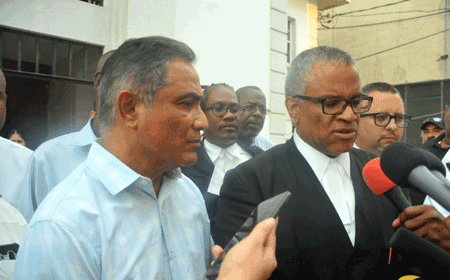BELIZE CITY, Mon. Apr. 8, 2019– After hearing submissions all day in an application that was hastily conceived by government attorneys who abandoned their original plan to request a variation of an interim injunction granted by Hon. Chief Justice Kenneth Benjamin last Wednesday, April 3 (in response to the constitutional challenge to the Special Agreement by members of the Opposition People’s United Party (PUP)), a panel of three Appeal justices, in a majority decision, dismissed the government’s application for the court to hear the matter.
Today’s Court of Appeal decision doomed the government’s chance of holding their scheduled International Court of Justice (ICJ) referendum on April 10, and could trigger another round of appeals from the Dean Barrow-led United Democratic Party government, to the Caribbean Court of Justice.
At 4:53 p.m., after adjourning for almost an hour, the three Appeal Court justices returned to the courtroom, and the President of the Court of Appeal, Hon. Justice Manuel Sosa, announced: “The court has reached a majority decision on the preliminary objection of the Respondents.”
Justice Sosa added, “The majority has reached the conclusion that the Court of Appeal lacks the jurisdiction under section 12 of the Court of Appeal Act. The majority does not consider it necessary to reach a conclusion on the remaining preliminary objections. The application is therefore refused.”
Justice Sosa said that the court would be making no order of cost and will in due course provide reasons for its decision in writing.
The injunction had been granted by Chief Justice Benjamin in order to allow time for the courts to consider the Opposition’s constitutional challenge to the Special Agreement that was signed between Belize and the Republic of Guatemala at the Organization of American States headquarters in Washington, DC, in December 2008.
The challenge to the Special Agreement, which had set the stage for the possible submission of the Guatemalan claim of Belize’s territory to the International Court of Justice for adjudication, is based on the legal premise that the Belize Foreign Minister violated the principle of the separation of powers, between the Executive and Legislative branches of government, when he signed without the agreement going to the House of Representatives.
Prime Minister Dean Barrow, Foreign Minister Wilfred Elrington, Chief Elections Officer Josephine Tamai, and Attorney General Michael Peyerifitte, are named as defendants in the claim, filed by PUP parliamentarians Hon. Cordel Hyde, area representative of Lake Independence; Hon. Julius Espat, area representative of Cayo South; Hon. Mike Espat, Toledo West area representative; Hon. Oscar Requeña, Toledo East area representative; Hon. Rodwell Ferguson, Stann Creek West area representative; and the PUP’s Pickstock standard bearer, Anthony Mahler.
The hearing of the substantive claim was scheduled to begin today before Chief Justice Benjamin, but the matter was adjourned to Monday, April 15, to allow for the Court of Appeal matter to conclude.
With today’s Court of Appeal ruling, the Chief Justice’s interim injunction restraining the government from holding the referendum remains in effect.
At the hearing, the government’s legal team was made up of Senior Counsels Lisa Shoman and Rodwell Williams, Solicitor General Lisa Montalvo, and Crown Counsels Agassi Finnegan and Briana Williams.
The PUP respondents were represented by Senior Counsel Eamon Courtenay and attorneys Anthony Sylvestre, Kareem Musa, Dean Molina and Gavin Courtenay. Today, they presented oral arguments to buttress their written submissions.
Senior Counsel Williams argued that the Court of Appeal could hear the government’s application, notwithstanding the 21-day period which must elapse from the time of the issuance of a judgment from the Supreme Court.
Williams further argued that the Court of Appeal Act is silent on the question of expeditious hearing. Relief lies in the inherent jurisdiction of the court, Williams further posited in his submission, which lasted all morning.
Justice of Appeal Sosa asked Williams if he could provide an authority for what he was stating in his submission — that the court had the capacity to hear the application.
Williams replied that he did not have an authority at that time, but if he found one, he would share it with the court.
Appeal Justice Samuel Awich asked Williams if he knew of any situation where a person was sentenced to death and applied to the court to be heard and the court turned him down.
Williams said he did not know of such a situation, and noted that he does not practice criminal law.
In their preliminary objections to the court hearing the application, Courtenay submitted that the applicants were in contempt of court and until they had purged themselves of the contempt, they should not be heard.
The contempt of court preliminary objection was supported by an affidavit filed by Anthony Mahler, who contended that Chief Elections Officer Tamai had instructed her staff to continue to prepare for the April 10 referendum in the face of the Chief Justice’s injunction.
Tamai’s instruction to her staff was in the form of an email which was leaked on social media.
Attorney General Peyrefitte, in an affidavit, confirmed that he was the person who instructed the Chief Elections Officer to continue to prepare for the referendum.
Courtenay also argued that the government had filed the application in violation of section 17 of the Court of Appeal Act, which stipulates that no appeal can be set down before the 21-day notice.
Williams wanted to bridge the time by applying the British practice. Courtenay, however, mentioned that there are specific provisions in the law, so there was no need to interpret. Courtenay went on to submit, “I want to underscore that section 17 speaks of appeal.”
“There is an impenetrable wall in front of my learned friend,” Courtenay submitted. “Hearing the appeal and granting the motion should be refused,” he said.
Courtenay said the order sought should be refused, along with the notice of motion for an expedited hearing.

